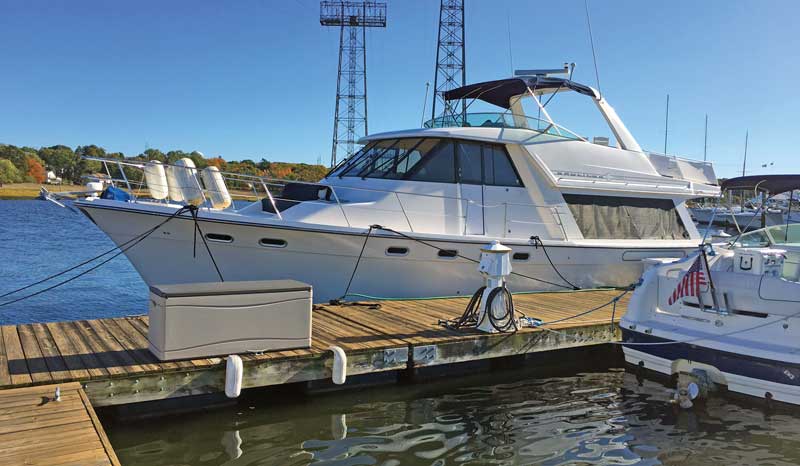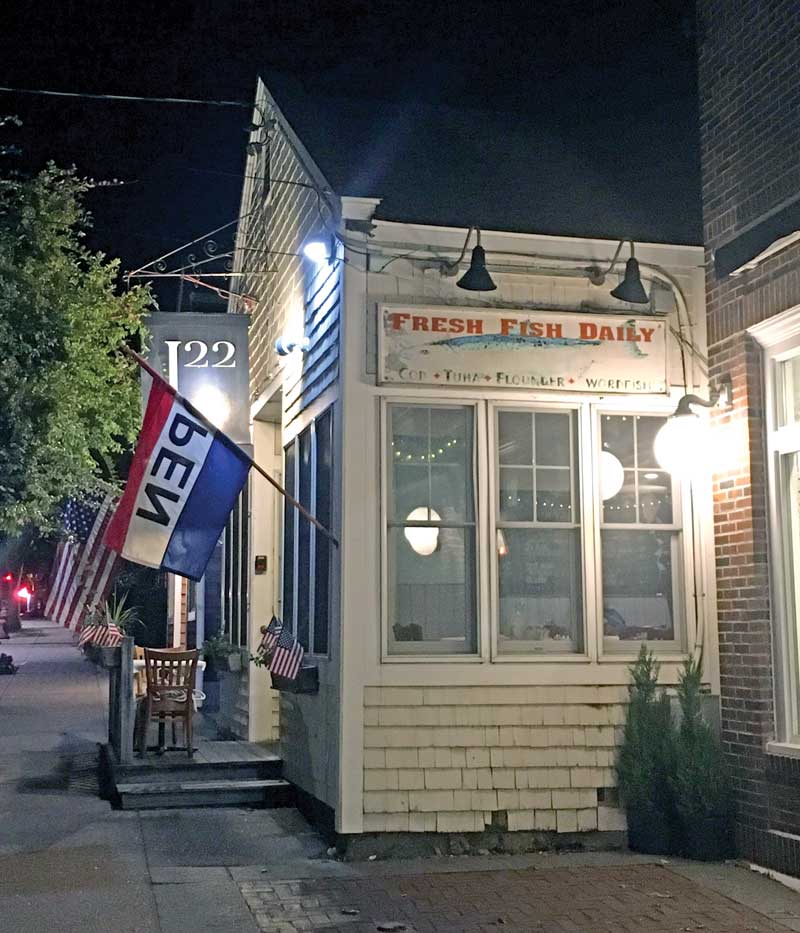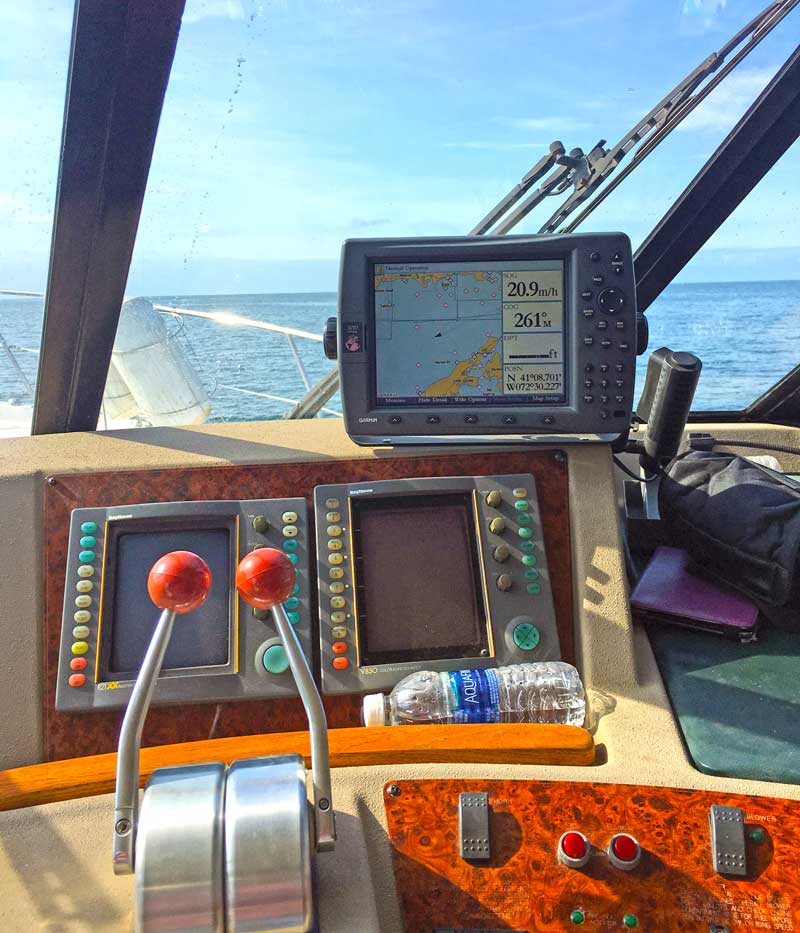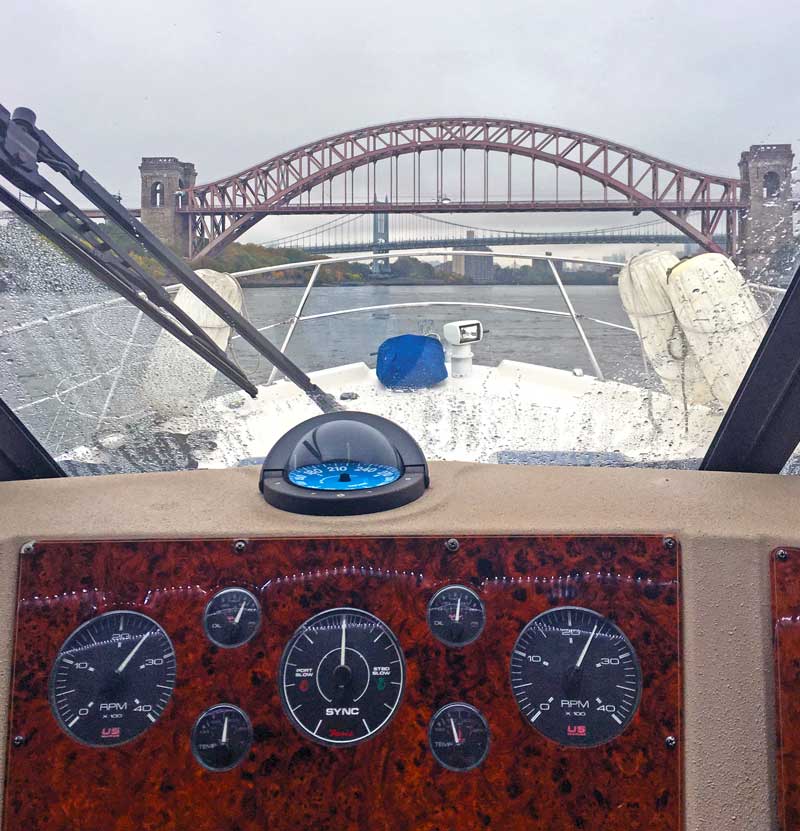A skipper endures a stressful boat delivery from Boston to Cape May with a couple whose opinions don't quite match up.

The Bayliner 4788 sliced through the sea at 17 knots, heading southwest down the New Jersey coast on a late October afternoon. We were heading for Cape May, with the boat’s final destination a marina in nearby Wildwood. We were racing against time with some urgency, especially now that daylight intervals were shorter. It was our third day out from Boston, and I was running a boat delivery with the owner and his wife aboard. The sun was dead ahead, lowering in the sky but still very bright, and it blazed through the tinted glass windshield of the pilothouse on a perfect level with my eyes. I instinctively reached up to pull down the visor, a few absent-minded times in fact, but I was quickly reminded that this was not my automobile, and there was no visor. Spots from the sun affected my vision, blanking it out in places. And yet I truly needed to see.
Steve, the boat’s owner, who had once been a small-plane pilot, turned to me. He was wearing aviator style sunglasses.
“Would you like me to relieve you for a while? Give your eyes a break from the sun?”
“Sure,” I replied, and turned over the helm.
Steve’s wife, Susan, sat behind us at a little dinette table, prattling and complaining nonstop. The litany of complaints had begun early in the trip and by now had reached an unnerving crescendo. “My husband seems hell-bent on finding the biggest waves out here to put me through,” she commented.
Steve was gently trying to introduce her to the ‘boating lifestyle,’ but she was having none of it, despite his increasingly desperate yet gentle entreaties. He had not expected her wholesale rejection of his efforts.
“Why can’t I see where we are on this thing?” She asked, holding up a paper chart of Long Island Sound, upside-down.
“Because, honey, that’s just a paperchart,” he replied. “To see where we actually are, you have to look up here at the chartplotter. That little black triangle thing shows where we are in real time.”

He answered her patiently; he was always patient, but now his voice showed strain. They were both past middle age and each on his and her second spouse, so some lessons had, presumably, been learned the first time around. And, like a good captain, or simply wanting to keep myself out of the meat-grinder, I kept my eyes forward and my mouth shut about anything except navigation. It was difficult to do, but I knew that in the end it might pay off in a decent gratuity. Now, nearly at the end of this trip, that was all that I cared about, besides keeping the boat off the beach.
Relieved at the helm, I descended the short staircase from the wheelhouse to the main saloon. It was the only place other than the flying bridge that offered a clear view of anything behind the boat. I wanted to look aft through the saloon glass doors to see what was happening with the engine exhaust. Steve had said that the port exhaust seemed to be putting out a lot more white smoke than the starboard engine. The engines, twin turbo diesels, were running at top cruising speed. But he was right; there was a greater volume of smoke and steamy mist coming out of the port exhaust, even though both were operating at the same RPMs. I looked; it did not seem excessive, but I felt it might be a good idea to check the engine temperature gauges once again to see if the port engine was running hot. Steve had purchased the boat used, and none of the gauges, including fuel, were reliable or in sync.
The boat had been out on Boston Harbor for sea trials with the broker and the mechanic aboard just two days before Steve closed the deal. She passed her trial with flying colors, so I trusted the boat somewhat, even though Steve knew that there was work to be done. Buying someone else’s older boat that they have grown tired of is always asking for trouble. But thus far she was holding up just fine.
“I assume you guys checked the sea strainers?” I asked, as an afterthought.
“The what?” Steve replied.
“We’ll cover that when we get in,” I sighed. Both engines were holding steady, if different, temperatures within the safe range.
Steve admitted to having no powerboating experience at all, and only a little bit of sailing experience when he was younger. Susan had no boating experience whatsoever; it was clear. But Steve had decided to introduce her to the whole new and wonderful world of the boating lifestyle. They lived in a fine home in Cape May and were planning to take their new boat to Florida for a few months.
Steve admitted that he had negotiated a sweet deal for the boat, bought it from a fellow getting along in years who was tired of it, didn’t use it much, and wasn’t terribly meticulous about maintaining it anymore either. A number of things didn’t work or didn’t work right, as we discovered after leaving the dock. This was hardly unusual, but the boat seemed to be in good condition overall.

Steve wanted to bring his new boat down to Cape May but prudently decided to hire a captain rather than attempt it himself since he had not made the trip before. He bought the boat in Boston. He advertised on a well-known captain job site. I saw it first and phoned him, offering my services. Steve also wanted more than a delivery; he wanted training on the way. I promised him the training at no extra charge. “We’ll learn about everything, and about your boat,” I told him, “From Aids to Navigation to Rules of the Road to whatever you want to know. Sure, I can show you how to change a fuel filter. But especially, you’re also going to drive her a good part of the way. You need wheel Hei-Tide Marine time in your new boat, and I’ll be right beside you to instruct and assist.” But then he added, “My wife Susan went with us out on the sea trial, and she liked it so much, she wants to come on the trip.” I felt an odd sense of foreboding, but I agreed.
“Well, we can teach her too,” I said. Then he emphasized, “I don’t want a rush delivery. I want us to take our time and learn.”
“No problem there,” I said, remembering that captains are paid by the day.
“One thing though. Susan doesn’t like the idea of rough water, so can you promise us a smooth ride?”
This request caught me aback. “I can promise you lumpy water,” I replied, as my heart sank. “It’s October. The weather can be unpredictable and nasty. We have to cross some areas of open water including Massachusetts Bay, Buzzard’s Bay, and Block Island Sound. Worst of all, we have to travel more than 120 miles down the New Jersey coast. There are few places to duck into if the weather changes on the way, and if the wind goes out of the Northeast, we’re screwed. Please try to talk her out of going.”
“That shouldn’t be difficult,” he replied happily. And in the end, it wasn’t difficult; it was utterly impossible. So, I planned the trip carefully; the first night we tied up in Newport. The second we docked in Port Washington, NY, and at close of the third day, in darkness, I docked her gently in her slip in Wildwood. I planned the trip, delayed for weather a couple of days, but in the end we had been in luck; a weather window had opened up just before we left, a high-pressure bubble over the northeast that promised a solid three to four days of light winds and steady mild weather, remarkable for late fall. It was like someone handing me a gold doubloon, so I grabbed it.
But in the end, there was no leisurely trip. After the first day, Steve had pushed hard—refueling late in the day, off the dock at dawn, running hard all day. Both were at fault; her for insisting on going, and then being a poor sport about it when seas turned even mildly choppy, and his fault for thinking that he could convert her into something that he should have realized from the start would simply not work. The sedate boating Chautauqua had turned into a desperate race to get to port and get Susan off the boat and onto flat ground before the learning cruise became a double murder-suicide.
On top of that, pandemic-related restrictions made life complicated. Marinas were short-staffed and closed earlier than usual, especially the fuel docks. Because it was the fall off-season, many marinas were simply not open. Fewer restaurants were open and those that were had to be reached by taxi or rideshare. Off the boat, we lived in a world of surgical masks. Docks were empty, surreal, and lonely at night, and I walked alone in empty isolation in the cold wind. It was still better than listening to them quarrel.

Now, as I ascended the stairs back into the wheelhouse, I heard Susan call out, “What the hell is that out there in the water?” That got my attention. I looked ahead just in time to grab the wheel away from Steve. It was a black barrel, floating, with the word “DANGER!” painted on it in big block letters, and we were about to run over it. I spun the wheel hard to port to head the boat directly out to sea. We were in 19 feet of water, the beach was much closer than it should have been, and the low swells had turned to steep chop with breaking crests right in our area. I swore.
“What, are we headed away from the shore?” Susan barked, with shrill sarcasm, and with condescending scorn, “I’m not sure I like that!”
I ignored her, remained silent, and kept the boat headed out to sea. Grinning, I inched up the throttles, which seemed to infuriate Susan even more. Steve said nothing. I had learned that his silence usually meant his tacit support for me or at the very least his refusal to get involved.
In a few minutes we were back into deeper water, and I began my explanation. “Close to shore doesn’t mean safety,” I said. “It means danger. We should be out in 40 to 60 feet of water and more, not 19. The Jersey Shore is shallow for a long way out. There are sandbars and fish traps. Besides, the swells get steeper and break as they move into the shallows. It’s a smoother ride out there.” Either subconsciously to please her and get relief from Susan’s constant yapping at him, or for some other reason, Steve had been vectoring closer and closer inshore while I had been trying to figure out what his engines were up to.
Thirty minutes before the sun set, we entered the jetties at Cape May. Dolphins were leaping and playing just off the end of the jetties. I could almost feel my imaginary gold doubloon still in my pocket, thinking I could rub it. A fragment of a reggae song came into my mind, and stuck there; Bob Marley singing, ‘Don’t worry, ‘cause every little thing gonna be alright.’
That night, as I drifted off to sleep in my bunk for the last time in the mirror-still marina slip, I realized that I had learned a few things, but they were mostly a repetition of lessons that I had learned before, on other trips, with other couples. But for Steve and Susan, these new and unexpected lessons were like a hopelessly tangled coil of line, to be carefully sorted out, perhaps. But at least I had done my job well, and besides, I had my doubloon in the form of a check. In the morning, on the parkway, I would point my rental car north and follow the liberating ribbon of tarmac home.
By Capt. Mike Martel